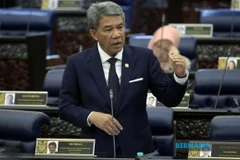GPFI F Chairman Tirto Kusnadi signed the LoI withFPMAJ Director General Toshihiko Miyajima during the Indonesia-Japanpharmaceutical and medical device business forum in the presence of IndonesianAmbassador to Japan and Micronesia Federation Heri Akhmadi and Osaka-basedIndonesian Consul General Dina Sutikno.
One of the objectives of signing the LoI at thebusiness forum is to support one of the grand themes of Indonesia's G20Presidency--strengthening global health architecture.
Indonesian pharmaceutical and medical deviceindustry is one of the potential sectors, with a positive growth of 2.1% in thesecond quarter of this year.
To that end, the Indonesian government declaredpharmaceutical and medical device industry as one of the country's sevenpriority sectors in the strategy of Making Indonesia 4.0.
As such, various incentives and easy regulationswill be offered in the Indonesian pharmaceutical and medical device sector./.




























